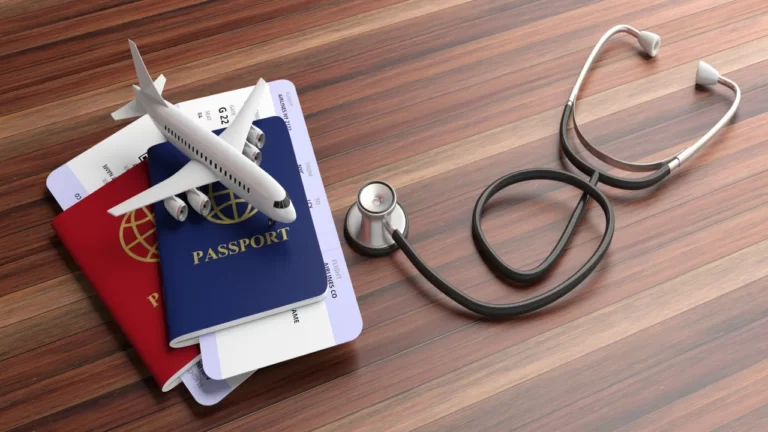Blog 1: Medical tourism in India

Medical tourism in India
Medical tourism is a rapidly growing practice of traveling to a foreign country to get the medical treatment to which patients cannot access in their own country. It has been observed that medical tourism commonly referred to as medical travel or global healthcare is becoming more popular (as many as 2 million patients) in the Indian landscape because of various benefits offered to the patient by the prevalent medical industry (expected to grow $13 Billion by 2026 under government’s heal in india initiatives).
Robust medical infrastructure and trained medical staff in Indian healthcare are the key determining factors for international patients to choose India as a medical tourism destination. Indian hospitals, within Medical Tourism Corporation’s network, are JCI accredited and highly renowned for their superior quality of healthcare. JCI accreditation ensures that the quality of medical and surgical care is at par with the American standards. Affordable medical and surgery expenses, high-end technological support and an excellent quality of healthcare in India allows even most budget conscious travelers to access first class services and luxurious amenities.
Why choose India ?
India has been the home for holistic healthcare which offers a variety of ways for patients to heal and recover. India is known for its natural medicines in the world and the holistic approach (which includes ayurvedic therapies, homeopathy, holistic healing centers) to healthcare makes India an interesting proposition for foreign patients to consider India as their medical treatment destination. World class infrastructure and highly trained medical professionals (trained in fluent english) ensures that the right treatment is provided hasslefree.
Best destinations for medical tourism in india
The best recommended medical destinations in India are Chennai, Mumbai, Delhi, Ahmedabad, Bangalore and other 3 tier cities well equipped with the latest medical infrastructure to provide flawless care to the patient.
Few of the initiatives taken by government to smoothen the medical tourism process for international patients are mentioned below:
1. E Visa for Medical tourists in addition to the existing medical and medical attendant visa
2. Patients not required to personally register with the FRRO (Foreign regional registration officers
3. Facilitation counters at 3 international airports and 5 more are on the anvil.
4. Accreditation by NABH was introduced for a new category called Medical Value Travel Facilitators who would play the coordinating role similar to tour operators
5. Health care portal www.indiahealthcaretourism.com has been augmented with comprehensive information on the accredited healthcare institutions in English, Arabic, Russian and french
Blog 2: How to take care of Alzheimer's patients

Elderly adults with Alzheimer’s disease might be difficult to care for, but there are techniques to help both the patient and the carer find it easier. These are some pointers for caring for elderly people with Alzheimer’s disease. Create a routine: A routine might make an elderly person with Alzheimer’s feel more at ease and secure. Have consistent schedules for meals, bedtimes, and activities, and give reminders as necessary. Provide a safe environment: Individuals with Alzheimer’s disease may get confused and disoriented, so it’s crucial to give them a welcoming and safe space. This may entail getting rid of potential dangers like sharp objects or trip hazards as well as labeling crucial goods like prescriptions and emergency contact information.
Provide help with daily living activities: Alzheimer’s disease can make it challenging for senior patients to conduct routine tasks like bathing, clothing, and grooming. Try to be patient and empathetic while extending aid as needed. Offering mental stimulation can help keep the brain active and may reduce the progression of Alzheimer’s disease. Examples of such mental stimulation include puzzles and games. To choose activities that are suitable for the patient’s cognitive ability, though, is crucial.
Effective communication might be difficult with an elderly patient suffering from Alzheimer’s disease, but there are techniques to make it simpler. Use simple words and brief sentences while speaking clearly and reassuringly. Avoid offering too many options or asking too many questions, as this can be confusing. Get expert assistance: Caregivers may require assistance and support as Alzheimer’s disease can be difficult to manage. To assist in managing the disease and to offer support to both the carer and the older patient, think about enlisting the aid of a professional, such as a support group or healthcare provider.
Complications in Alzheimer disease:
Alzheimer’s disease is a neurological condition that progressively impairs memory, thinking, and behavior. With the right care and therapy, Alzheimer’s disease has a number of consequences that can be controlled. These are some pointers for handling problems caused by Alzheimer’s:
Memory loss: Alzheimer’s disease is frequently accompanied by memory loss. By establishing a regular pattern, employing memory aides like calendars or notes, and keeping familiar objects in the same location, carers can support people with Alzheimer’s.
Changes in behavior: Individuals with Alzheimer’s disease may exhibit agitation, hostility, or wandering. By establishing a peaceful and secure atmosphere, keeping a regular schedule, and employing distraction strategies, these behaviors can be controlled.
As Alzheimer’s disease worsens, people may find it difficult to communicate with or understand others. To improve communication, carers might use plain language, speak slowly and clearly, and use visual assistance.
Sleep disturbances: People with Alzheimer’s frequently experience sleep disturbances. In addition to limiting daytime naps and establishing a regular sleep schedule, carers can also provide a peaceful and relaxing sleeping environment.
Nutrition: Those who have Alzheimer’s disease may have trouble eating or forget to eat. Little, regular meals, a healthy, balanced diet, and appropriate fluids can all be provided by carers.
Medication management: In people with Alzheimer’s disease, medication management is crucial. By following a prescription regimen, employing pill organizers, and keeping an eye out for adverse effects, carers can assist their charges.
Incontinence: Incontinence is a symptom that can be challenging to treat. Incontinence products, a regular toileting regimen, and aid with hygiene are all options for carers.
Safety is a top concern for people with Alzheimer’s disease. With the removal of trip hazards, the installation of grab bars, and the use of assistive equipment, carers can lower the risk of falls and injuries.
To properly manage the problems of Alzheimer’s, constant collaboration with healthcare professionals is essential. To prevent carer burnout, carers must also look after their own physical and emotional needs.
